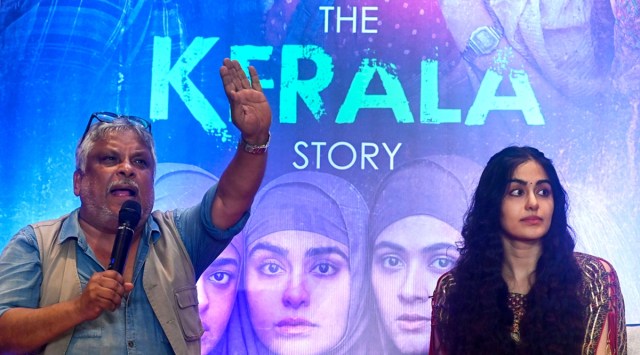In the battle of bans and tax-free benefits, cinema is the loser
9:48 AM
Posted by Fenil Seta

Avijit Ghosh (THE TIMES OF INDIA; May 21, 2023)
Nothing reflects India’s polarized polity better than the conflicting reactions to ‘The Kerala Story’, a film that recounts the ordeal of three girls — two Hindu and one Christian — who suffer in different ways at the hands of a bunch of radicalized Muslims. One of them ends up accompanying an ISIS terrorist.
On Thursday, the Supreme Court stayed a ban on the film imposed by Trinamool-run West Bengal. The film is not banned in DMK-ruled Tamil Nadu but theatres in the southern state are not showing it; just like cinema halls in Gujarat had once bypassed ‘Parzania’ (2005) and ‘Fanaa’ (2006). ‘Parzania’ was based on the 2002 Gujarat riots. ‘Fanaa’ landed in trouble after its lead actor Aamir Khan spoke up for those displaced by the Narmada dam project.
On the other hand, several BJP-ruled states such as Uttar Pradesh, Madhya Pradesh, Haryana and Uttarakhand have declared ‘The Kerala Story’ tax-free. Similarly, ‘The Kashmir Files’, which focused on the impact of terrorism on the lives of Pandits in the Valley, earned a tax-holiday in at least eight BJP-governed states last year. Assam even granted a half-day leave to its government employees to watch the film.
Granting tax exemption or banning a film is a state government’s prerogative. However, the privilege was meant to be given to award-winning films and to movies that helped forge a more progressive social order. But as recent events show, banning a film or declaring it tax-free is part of a new playbook where support or opposition depends on the ruling party’s ideological moorings and vote base. In this running battle, ‘ban’ is the other of ‘tax-free’.
It wasn’t always like this. To understand how the sands have shifted in the politics of tax exemptions and bans, one must look at the past. Since Independence, dozens of films have been banned temporarily (like ‘Aandhi’ during the Emergency) or permanently in India. Hundreds have been declared tax-free, many for dubious reasons.
In June 1970, TOI reported that many big daddies of Bombay cinema were rushing to Bhopal for tax exemptions. In a short period of 10 months, as many as eight films were declared tax-free in then Congress-ruled Madhya Pradesh.
“Some ministers and ex-ministers are alleged to have specialized in exerting pressure on reluctant officials, who see no point in sanctioning such requests at the cost of the state exchequer. One such official who refused to attend a special show of a third-rate film and be a party to the exemption business incurred the wrath of a prominent ex-minister,” the report said.
In 1980, Feroz Khan’s guns-and-glamour yarn, ‘Qurbani’, which began with a panegyric to the late Sanjay Gandhi, was declared tax-free by the Congress government in Maharashtra. “The controversial award…was widely discussed in the media,” noted Ashish Rajadhyaksha and Paul Willemen in ‘Encyclopaedia of Indian Cinema’.
According to the Bombay Entertainment Duty Rules, 1958, exemption could be granted to films winning the President’s Gold medal (later National Award winners) or to films which fulfilled criteria of educational, cultural or social purpose of a high order, following the recommendation of an advisory committee appointed by the state government.
But the Maharashtra government routinely flouted rules announcing tax-holidays for 55 films over a period of seven years in the 1990s, a CAG report said. The report, which did not mention these films by name, estimated that the government had lost at least Rs 19 crore. Congress (1990-95) and BJP-Shiv Sena (1995-99) were at the helm then.
Several of the tax-exempted films were routine formula films. ‘Agni Sakshi’ (1996), a remake of the Julia Roberts thriller, ‘Sleeping With The Enemy’ (1991) produced by Binda (Bindumadhav) Thackeray, the eldest son of Shiv Sena supremo Bal Thackeray, received tax exemption. That apart, regular commercial films got a no-tax run.
Producer Pooja Bhatt’s film, ‘Dushman’ (1998) starring Kajol and Sanjay Dutt, was given a 40% tax exemption by the BJP-Shiv Sena government after a special committee endorsed its “social and educational value”. The same year, letters to TOI raised questions over the tax-free status of films like ‘Major Saab’ and ‘Satya’.
The trend continued in the new millennium. In 2005, ‘Fareb’, an extra-marital thriller with Manoj Bajpayee and Shilpa Shetty in lead roles, was granted tax exemption in UP, then governed by Samajwadi Party (2003-07).
Evidently either proximity to power or corruption were key to earning tax exemption to undeserving films. The reasoning is different in the case of ‘The Kashmir Files’ and ‘The Kerala Story’, both major box-office winners. In these cases, it seems, tax concessions are being weaponized to boost ideologically aligned films in an effort to capture cine-goers’ minds and hearts.
On the other hand, banning the same film reveals the hollowness and the cynical side of those claiming to offer an alternative, discourse-driven politics.
Ironically last year, director Nagraj Manjule’s ‘Jhund’, a sledgehammer film on caste, class and the transformative power of sports, was denied the concession. Art and film lovers were the losers.
This entry was posted on October 4, 2009 at 12:14 pm, and is filed under
Aandhi,
Agni Sakshi,
Bollywood News,
Dushman,
Fanaa,
Fareb,
Gujarat,
Jhund,
Major Saab,
Parzania,
Qurbani,
Satya,
Tamil Nadu,
The Kerala Story,
West Bengal
. Follow any responses to this post through RSS. You can leave a response, or trackback from your own site.
Subscribe to:
Post Comments (Atom)
Post a Comment